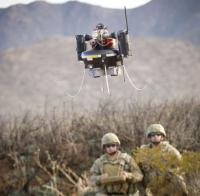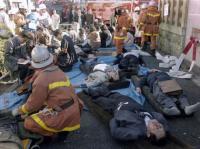-
Leader of Nigeria’s Islamist Ansaru group arrested in Nigeria
Khalid al-Barnawi, the leader of Nigeria’s Ansaru jihadist group, a Boko Haram splinter group ideologically aligned with al-Qaeda in the Islamic Maghreb, has been arrested, a Nigerian army spokesman said on Sunday. Al-Barnawi, 47, was born as Usman Umar Abubakar in Biu town in northeast Borno state. He is one of three Nigerians listed by Washington in 2012 as “specially designated global terrorists.
-
-
ISIS planning to use drones for radioactive attacks on Western cities

Prime Minister David Cameron warned that ISIS terrorists are planning to use drones to spray nuclear material over Western cities in a lethal “dirty bomb” attack. Security experts are worried about jihadists buying simple drones, which are widely available, and use them to carry radioactive material into the centers of large cities in attacks which would kill thousands and contaminate large sections of cities, making entire areas uninhabitable for years.
-
-
Al-Shabaab leader in Somalia killed in U.S. strike

Hassan Ali Dhoore, a senior leader of the Somali al-Shabaab Islamist group, was killed by a U.S. drone strike on Thursday. On 5 March a U.S. air strike killed more than a 100 al-Shabaab fighters in one of the group’s training facilities.
-
-
ISIS rocket expert killed in U.S. strike
Jasim Khadijah, a former Iraqi officer in Saddam Hussein’s army who joined ISIS and led the organization’s rocket development effort, was killed by a drone strike in northern Iraq Sunday. Khadijah was responsible for a rocket attack last month on a U.S. military base near the town of Makhmour, located between Mosul and Kirkuk. That attack killed marine staff sergeant Louis Cardin and wounded eight others.
-
-
ISIS has changed international law

Two years ago, virtually no one had heard of the Islamic State of Iraq and Syria (ISIS). In a January 2014 New Yorker interview, President Obama dismissed the group as “Junior Varsity.” Since then, ISIS has emerged as one of the most wealthy, powerful, and dangerous terrorist organizations that ever existed. UN Security Council Resolution 2249, adopted in November 2015, will likely be viewed as confirming that use of force in self-defense is now permissible against “nonstate actors” such as terrorists when the territorial state is unable to suppress the threat that they pose. The implication of this newly accepted change in the international law of self-defense is that any nation can now lawfully use force against deadly nonstate actors in another country if the government of that country is unable or unwilling to suppress the threat within its borders. With so many potential targets in so many countries – the U.S. terrorist organizations list, for example, includes fifty-eight terrorist groups headquartered in thirty-five different countries (in addition to ISIS in Syria/Iraq) — one must ask whether the possibility of abuse will ultimately outweigh the benefits of weakening ISIS.
-
-
Dozens of Gitmo prisoners to be transferred to other countries in the next two weeks
The United States plans to move out a dozen inmates from Guantanamo Bay in the next few weeks, part of the final push by President Barack Obama to shut down the facility. Obama, since his election to the presidency, has said he wants to transfer the men to their home countries, or to maximum security prisons in the United States.
-
-
EU cities have 900 “no-go zones”: Hungary’s government
Hungary’s right-wing government, ahead of a national referendum on the question of EU-mandated refugee quotas for EU member states, has claimed in a Web site post which supports the government’s anti-migration stance, that there are 900 “no-go zones” in London, Paris, Stockholm, and Berlin. The government Web page, entitled “We say no to mandatory migrant quotas,” defines the 900 “no-go zones” as “neighborhoods not under control, or hardly kept under control,” where “the norms of the host society … barely prevail.”
-
-
Is Belgium’s nuclear security up to scratch?
Belgium’s counter-terrorism efforts are once again being called into question following the recent tragedies in Brussels. The attacks were carried out against soft targets – the public check-in area of Brussels Airport and Maelbeek metro station – but a series of unusual and suspicious occurrences were also reported at nuclear facilities in the country. These events highlight the very real threat to nuclear facilities. For Belgium, this recent episode is one item on a long list of security concerns. Based on this history, the Belgian authorities should be primed to take nuclear security especially seriously. But there are serious questions about whether they are.
-
-
Montenegro expels 58 members of Japanese doomsday cult Aum Shinrikyo

Montenegro has expelled fifty-eight foreigners, all members of the Japanese doomsday cult Aum Shinrikyo which, in March 1995, launched a deadly nerve gas attack on Tokyo’s underground. Twelve people were killed and thousands injured in Aum Shinrikyo’s nerve gas attack on a Tokyo commuters.
-
-
Sen. Wyden said he would filibuster efforts to mandate back doors

Senator Ron Wyden (D-Oregon), a critic of the NSA domestic spying programs, said he would filibuster any attempt by fellow lawmakers to require U.S. technology companies to weaken the encryption systems with which they equip their devices. Referring to Apple fight against a court order requiring the company to relax the encryption of iPhone used by the two San Bernardino terrorists, Wyden said that consumers were asking: “Are these for the privacy rights of the dead terrorist?”
-
-
French government abandons plan to strip terrorists of French citizenship
The French government has decided to abandon plans to strip convicted terrorists with dual nationality of their French citizenship and deport them.French president Francois Hollande also wanted to make the state of emergency, which gives the police special powers and which was imposed for three months after the November attacks, a permanent feature of the constitution, but the government was forced to abandon this proposal, too, in the face of stiff opposition.
-
-
Populist German party calling for banning construction, operation of mosques
A 45-page draft policy proposal, to be debated at the end of April at the annual conference of the AfD (Alternative für Deutschland),a populist, anti-immigration party which has been gaining in the polls, would prohibit the “construction and operation of mosques.” The policy draft, titled “Courage to take responsibility,” states that “Islam does not belong to Germany.” Mosques are conducive “not only to common prayer, but also to the spread of Islamic teachings directed towards the removal of our legal order,” the draft says.
-
-
American Airlines cancels all Brussels flights until 7 April
American Airlines announced it has canceled all flights to and from Brussels until 7 April. The carrier’s decision is in response to the 22 March suicide bombing attack at the Brussels airport. The explosion occurred near the American Airlines counter, and some of the thirty-two people killed in the blast were about to board an AA flight.
-
-
FBI cracks terrorists’ iPhone without Apple's help
The Justice Department on Monday asked a court to withdraw the government’s request that the court order Apple to help the FBI gain access to the encrypted iPhone used by the San Bernardino terrorists. The Justice Department filed the request after the FBI had successfully accessed data stored on an encrypted iPhone. The FBI wanted the court to compel Apple to relax the 10-attempt limit, which is part of the encryption system which comes with the device. If there are more than ten attempts to guess the password, the phone locks forever and all the data on it is wiped out. The FBI argued that its computers, using brute-force, would be able to break the phone’s password, but that it would take more than ten attempts.
-
-
ISIS “advanced plans” to attack Jewish children in Turkey thwarted

Isis has developed plans to carry out a terror attacks targeting Jewish children in Turkey, according to intelligence officials. Six operatives from the terror group, arrested in the Turkish city of Gaziantep last week, told Turkish investigators about an “imminent” attack against Jewish children. Istanbul’s synagogue in Beyoglu was one of the attacks. The synagogue operates a community center and a school.
-
More headlines
The long view
Factories First: Winning the Drone War Before It Starts
Wars are won by factories before they are won on the battlefield,Martin C. Feldmann writes, noting that the United States lacks the manufacturing depth for the coming drone age. Rectifying this situation “will take far more than procurement tweaks,” Feldmann writes. “It demands a national-level, wartime-scale industrial mobilization.”
No Nation Is an Island: The Dangers of Modern U.S. Isolationism
The resurgence of isolationist sentiment in American politics is understandable but misguided. While the desire to refocus on domestic renewal is justified, retreating from the world will not bring the security, prosperity, or sovereignty that its proponents promise. On the contrary, it invites instability, diminishes U.S. influence, and erodes the democratic order the U.S. helped forge.
Fragmented by Design: USAID’s Dismantling and the Future of American Foreign Aid
The Trump administration launched an aggressive restructuring of U.S. foreign aid, effectively dismantling the United States Agency for International Development (USAID). The humanitarian and geopolitical fallout of the demise of USAID includes shuttered clinics, destroyed food aid, and China’s growing influence in the global south. This new era of American soft power will determine how, and whether, the U.S. continues to lead in global development.
Water Wars: A Historic Agreement Between Mexico and US Is Ramping Up Border Tension
As climate change drives rising temperatures and changes in rainfall, Mexico and the US are in the middle of a conflict over water, putting an additional strain on their relationship. Partly due to constant droughts, Mexico has struggled to maintain its water deliveries for much of the last 25 years, deliveries to which it is obligated by a 1944 water-sharing agreement between the two countries.
How Disastrous Was the Trump-Putin Meeting?
In Alaska, Trump got played by Putin. Therefore, Steven Pifer writes, the European leaders and Zelensky have to “diplomatically offer suggestions to walk Trump back from a position that he does not appear to understand would be bad for Ukraine, bad for Europe, and bad for American interests. And they have to do so without setting off an explosion that could disrupt U.S.-Ukrainian and U.S.-European relations—all to the delight of Putin and the Kremlin.”
How Male Grievance Fuels Radicalization and Extremist Violence
Social extremism is evolving in reach and form. While traditional racial supremacy ideologies remain, contemporary movements are now often fueled by something more personal and emotionally resonant: male grievance.
